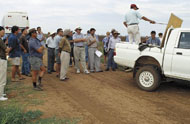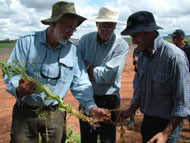
Advisory services
The Station has officers who deliver advisory programs on all aspects of horticultural crops, field crops, pasture, and irrigation management. These programs are primarily carried out through field days, seminars, discussion groups, dissemination of written material and individual contact.
Specific activities include the following.
Citrus Program
Citrus is a major horticultural crop in the Riverina, with approximately 8500ha of trees planted. Through its Griffith Centre for Irrigated Agriculture, NSW Agriculture provides an important service to the industry, with full-time horticulturists located at both the Griffith Centre and Yanco Agricultural Institute.
The Citrus Horticulturist provides a range of technical services to the industry through farm advisory visits, field days, training courses and Cittgroup activities, and works closely with the Australian citrus industry.
The Centre has a number of citrus trials, including:
-
a common orange variety planting, which has been used to assess varieties for the fresh juice market;
-
a Satsuma mandarin planting, which is aimed at developing a market for this fruit;
-
a mandarin variety arboretum, which allows growers to assess the potential of new cultivars.
Viticulture Program
Winegrapes are a major horticultural crop in the Riverina. More than 16,000ha of winegrapes were planted by 2002, having increased from 5000ha in 1992. NSW Agriculture provides an advisory service to the industry from the GCIA, with research officers operating from the National Wine and Grape Industry Centre at Wagga Wagga, and the Elizabeth Macarthur Agricultural Institute at Menangle.
The Horticulturist (Viticulture) is currently working on the following areas of research and extension:
-
Canopy management for winegrape quality.
-
Irrigation of winegrapes for quality production.
-
Safe use and storage of agrochemicals — HACCP Standards.
-
Nematode infection of grapevines.
-
High and medium vigour rootstock trials for quality winegrapes.
-
Clonal evaluation of winegrape varieties / vine improvement.
-
Winegrape crop estimation and use of VineLOGICcomputer program.
-
Vineyard soil management.
District and extension agronomists
Three agronomists, based at the GCIA, service the Coleambally, Griffith and Hillston agronomy districts.
These district and extension agronomists aim to bring about beneficial change in the agricultural community by providing targeted information and advice to help all sectors of industry identify where change is needed, and to assist people to make these changes. Their activities include:
-
maintaining and strengthening communication between research providers and industry;
-
developing on-farm sustainability indicators and benchmarks;
increasing adoption of bed/furrow cropping systems for long-term sustainability; -
facilitating grower discussion groups on crops such as rice, maize, soybeans and wheat;
-
evaluating and identifying plant varieties appropriate to farm systems to improve yield, quality and pest/disease resistance;
-
providing advice on weed/insect/disease identification and management;
-
improving adoption of effective herbicide resistance management strategies;
-
promoting best management practices for increasing water use efficiency;
-
providing topical radio reports and newspaper/magazine articles on a regular basis.
-
representing NSW Agriculture on various committees at local, state and national levels.
Water Management Subprogram
Water Management Subprogram staff aim to assist irrigators, suppliers and contractors in the irrigation industry by:
-
promoting the relevance and importance of plant, soil and water relationships in irrigated agriculture;
-
promoting the adoption of best irrigation management practices (BIMPs) in both production and conservation through Land and Water Management Plans, Water Use Efficiency Scheme, Special Conservation Scheme loans, field days and grower meetings;
-
maximising the efficient use of every megalitre of water available to irrigated agriculture through benchmarking, with comparison of information such as dollars per megalitre, tonnes per megalitre, and megalitres per hectare;
-
providing technical advice and information on whole-farm irrigation system design, construction and management; irrigation scheduling; irrigation agronomy; and irrigation soil management.
The water management staff have expertise in a variety of summer, winter and horticultural crops. They provide the above services to the following areas:
-
Lower Lachlan
-
Lower Murrumbidgee
-
Coleambally Irrigation Area
-
Murrumbidgee Irrigation Area west of the Whitton stock route
-
Tabbita Irrigation District
-
Wah Wah Irrigation District.

